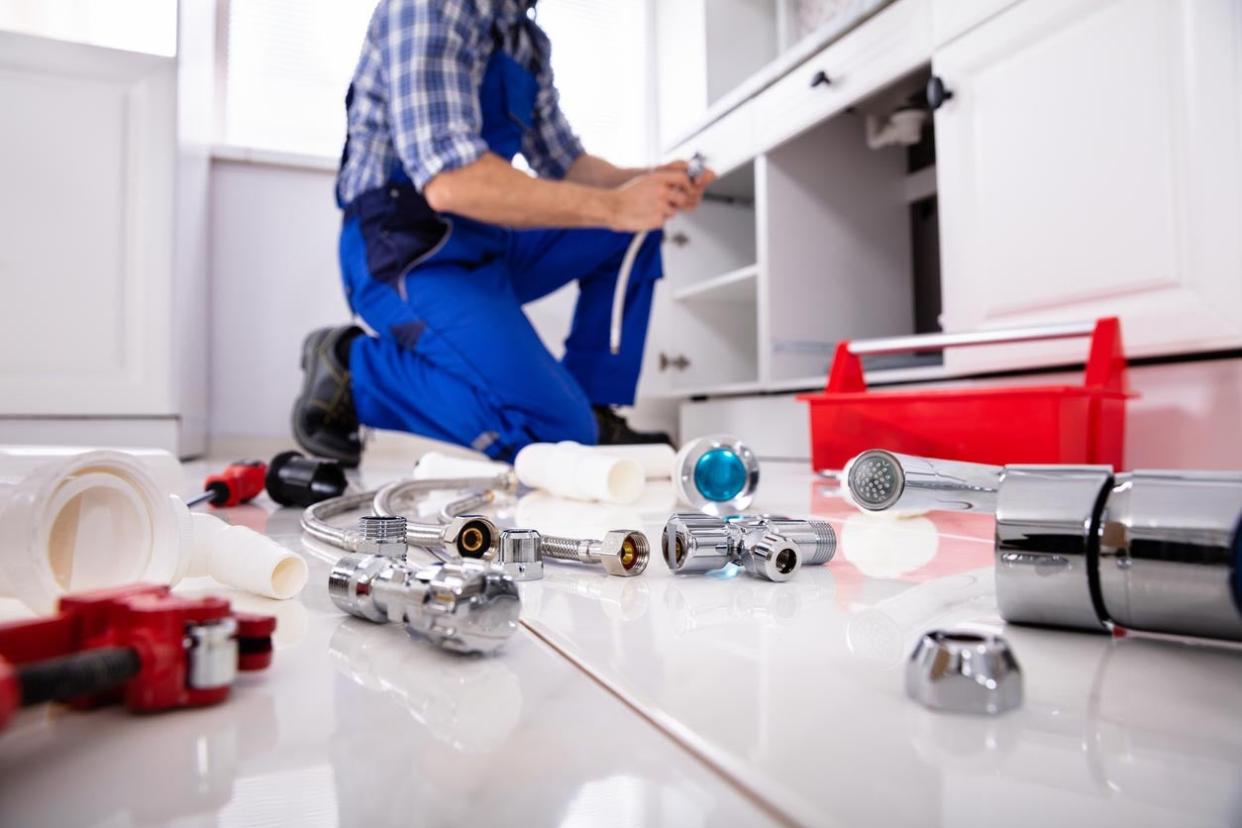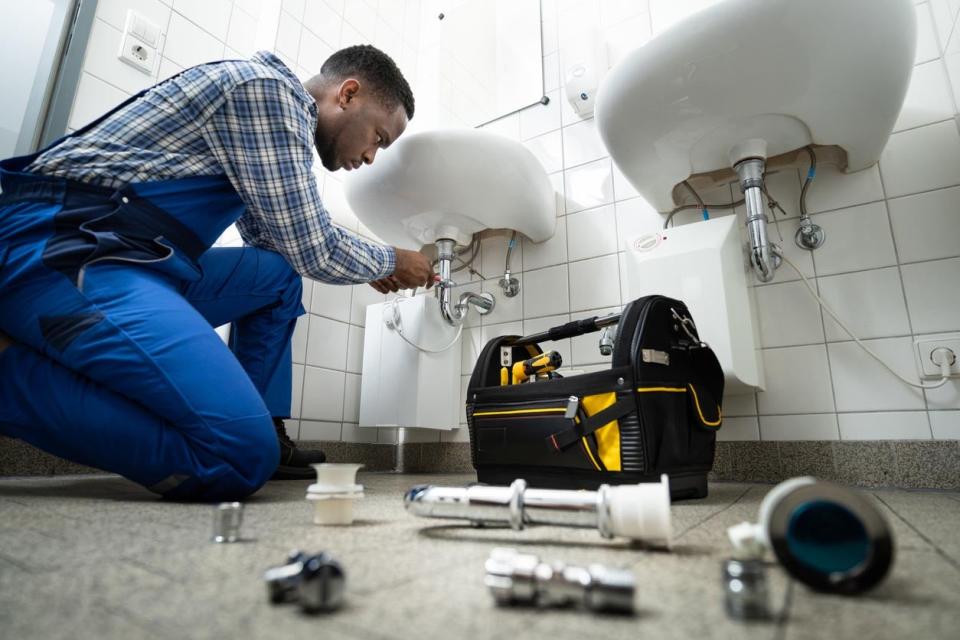How Much Is the Average Plumber Salary?

Highlights
A plumber typically makes between $37,250 and $101,190 per year, and the national average is around $60,090.
The exact salary a plumber earns will depend on their education level, experience, skills, and geographic location.
An apprentice plumber is likely to make closer to the low end of the salary range, while journeyman and master plumbers will earn more due to their experience and credentials.
Plumbing can be a rewarding and lucrative career. But exactly how much do plumbers get paid? The average plumber salary can vary based on several factors such as location, level of experience, and specialization. Typically, plumbers undergo training at a plumbing school or through an apprenticeship program. Once they’ve gained the necessary skills and certifications, they can start working as professionals.
Plumbers can earn either an hourly rate or an annual salary, depending on the type of work they do. How much do plumbers charge per hour? The plumber hourly rate can vary widely, but according to the U.S. Bureau of Labor Statistics, it falls between $17.91 and $48.65 per hour, with the national average at $28.89. Journeyman plumbers, who have completed their apprenticeship and gained a certain level of experience, earn more than entry-level plumbers. A journeyman plumber salary is approximately $65,448 per year.
Master plumbers, who have even more experience and expertise, can command a higher salary. A master plumber’s salary can go well above $100,000, depending on their location and the demand for their services. It’s important to note that plumbers may also charge different rates for emergency or specialized services, which can affect their overall earnings.
“When I began my plumbing career about 30 years ago, my earnings were in the ballpark of $25,000 to $30,000 annually,” explains Andrew Miles, CEO at WaterFilterCast.com. “In the current market, a regular plumber might expect to make between $55,000 and $60,000. Master plumbers, with their additional expertise and responsibilities, tend to earn significantly more, often pulling in upwards of $70,000 to $80,000 or more annually, depending on their location and clientele.”
The average cost of a plumber also varies by state. In areas with high demand for plumbing services and a higher cost of living, plumbers tend to earn more. For instance, plumbers in California or New York often have higher salaries compared with those in less densely populated or lower-cost states.
The U.S. Bureau of Labor Statistics shows that the median income for plumbers in the United States is approximately $60,090 per year. This figure can significantly change based on factors such as location, specialization, and the individual plumber’s experience and qualifications. For those considering a career in plumbing, it’s essential to research the local market and understand the potential earning opportunities that are available.
Factors in Calculating the Average Plumber Salary

Photo: istockphoto.com
How much money do plumbers make? Calculating the average licensed plumber salary involves taking into account several key factors that contribute to the considerable variation in earning across different regions. The national average plumber salary provides a useful starting point, but it can significantly differ from state to state due to a plumber’s education and experience level, any additional skills they may have, and geographic location.
Education Level
The importance of education level in determining plumber rates per hour cannot be overstated. While plumbing is often associated with hands-on skills and practical experience, the level of education a plumber attains can have a significant impact on their earning potential.
Training and certification. Plumbers typically start their careers by attending plumbing schools, taking one of the best online plumbing courses, or completing apprenticeship programs. These educational paths provide them with the fundamental knowledge and skills required to excel in the field. Upon completing these programs and obtaining the necessary certifications, plumbers are better positioned to command higher wages. Many employers prefer hiring plumbers who have received formal training and passed licensing exams, which often translates to a higher average salary.
Specialization. Plumbing is a diverse field, encompassing areas such as residential plumbing, commercial plumbing, pipe fitting, and more. Plumbers who pursue additional education and specialization in specific areas within the industry often command higher salaries. For instance, a plumber with expertise in medical gas systems or sustainable plumbing solutions may find higher-paying job opportunities.
Advancement opportunities. Higher education can also open doors to more advanced positions within the plumbing industry, such as becoming a master plumber or plumbing contractor. These roles typically come with increased responsibilities and higher compensation.
Professional development. Continuing education and staying updated on the latest plumbing technologies and techniques are essential for maintaining a competitive edge in the field. Plumbers who invest in ongoing education are more likely to earn higher salaries due to their ability to offer modern solutions and adapt to industry changes.
Regulatory requirements. In many regions, plumbers are required to meet specific educational and licensing requirements. Meeting these regulatory standards not only ensures that plumbers are qualified to perform their work but can also influence their earning potential.
Experience Level
Experience level is another important factor in determining plumber salary by state. Plumbers, like many other professions, see a significant impact on their earnings based on the number of years they have spent in the field. Experience level is vital for a few reasons.
Skill development. Experience brings with it a deepening of skills and expertise. Plumbers who have worked in the field for many years have encountered a wide range of plumbing issues and have developed effective problem-solving skills. Those who have the ability to diagnose and address complex plumbing problems often command higher wages too.
Efficiency and productivity. Experienced plumbers tend to work more efficiently and complete tasks more quickly. This not only benefits employers by reducing labor costs but also enables plumbers to take on more jobs, which can translate into higher income.
Client trust. Experienced plumbers often have a track record of successful jobs and satisfied clients. Building trust in the industry can lead to a loyal customer base, repeat business, and referrals, all of which contribute to higher earnings.
Specialization. Over time, plumbers may choose to specialize in specific areas of plumbing, such as gas line installation, sustainable plumbing, or high-end residential projects. Specialization can lead to a niche market where experienced professionals can earn higher fees due to their unique expertise.
According to James De Meo, master plumber and HVAC engineer at This Fixed House, “With the right level of training and hands-on experience, plumbers can earn a good salary starting from $30,000 to $40,000 for entry-level plumbers with 1 to 2 years experience.” From there, plumbers can expect their salary to increase as they gain more experience in the field. As De Meo explains, “Journeyman plumbers with a good level of practical experience [can] command $40,000 to $60,000, [while master plumbers can make] $60,000 to $100,000+, and even higher for professionals who transition into running their own business.”

Photo: istockphoto.com
Additional Skills
While core plumbing skills are essential, plumbers who possess supplementary skills are often more versatile, competitive, and in demand in the job market, which ultimately leads to higher earnings.
Diversification of services. Plumbers with additional skills, such as welding, HVAC (heating, ventilation, and air conditioning) expertise, or knowledge of sustainable plumbing practices, can offer a broader range of services. This diversification allows them to take on a wider variety of projects, attract more clients, and command higher rates for specialized work.
Increased demand. As technology and environmental concerns continue to shape the plumbing industry, skills related to energy-efficient systems and eco-friendly solutions are becoming increasingly sought after. Plumbers with expertise in these areas are well-positioned to meet the growing demand for green plumbing solutions, which can translate to a higher plumber wage.
Problem-solving. Additional skills often enhance a plumber’s problem-solving abilities. A plumber who can address complex issues, such as troubleshooting sophisticated HVAC systems or implementing smart water-saving technologies, is seen as an invaluable resource. Clients are willing to pay more for professionals who can deliver innovative and efficient solutions.
Safety and compliance. Skills related to safety and compliance with industry regulations are essential. Plumbers who are well versed in safety protocols, local building codes, and industry standards can reduce the risk of costly mistakes and ensure that projects are completed to the highest standards. Clients are willing to invest more in plumbers who prioritize safety and compliance.
Advanced certifications. Many additional skills come with the opportunity to obtain advanced certifications, which can further validate a plumber’s expertise. These certifications often come with higher earning potential, as they indicate a higher level of proficiency and commitment to ongoing professional development.
Niche markets. Plumbers with specialized skills can tap into niche markets, such as medical gas systems, industrial plumbing, or luxury home installations. In these markets, the demand for specialized knowledge often results in premium compensation.
Geographic Location
Geographic location plays a crucial role in determining the average hourly rate for a plumber. Plumbers’ earnings can vary significantly from one region to another due to several key factors.
Cost of living. The cost of living in a given area has a direct impact on plumber salaries. In regions with a high cost of living, such as major cities like New York or San Francisco, plumbers tend to make higher wages to cover their living expenses. Conversely, salaries may be adjusted accordingly in areas with a lower cost of living.
Market demand. The demand for services from the best plumbing companies can differ widely depending on the region. Areas experiencing rapid population growth, construction booms, or a high density of commercial enterprises often have a greater need for plumbing services. Plumbers in these locations may see higher wages due to increased demand for their skills.
Regulations and licensing. Licensing requirements and regulations for plumbers can vary by state or municipality. Plumbers in regions with more stringent licensing and certification requirements may have an advantage when it comes to salary negotiation since their qualifications are more in demand.
Competition. The level of competition among plumbers in a specific area can affect salaries. In highly competitive markets, plumbers may need to offer competitive rates to attract clients. In regions with fewer plumbers, professionals may be able to charge higher rates for their services.
Climate and seasonal variations. Climate and weather conditions can also impact the need for plumbing services. In regions with harsh winters, plumbers may be busier dealing with frozen pipes and heating systems, potentially leading to higher salaries during certain seasons.
Local economic factors. The overall economic health of a region can influence salaries. In areas with a strong economy and a thriving construction industry, plumbers may find higher-paying job opportunities, since more projects are available.
State | Mean Hourly Wage | Mean Annual Salary |
Alabama | $23.80 | $49,510 |
Alaska | $41.74 | $86,820 |
Arizona | $27.70 | $57,610 |
Arkansas | $22.48 | $46,750 |
California | $35.75 | $74,360 |
Colorado | $29.69 | $61,750 |
Connecticut | $32.94 | $68,520 |
Delaware | $29.57 | $61,510 |
District of Columbia | $37.15 | $77,260 |
Florida | $23.48 | $48,830 |
Georgia | $28.29 | $58,830 |
Hawaii | $36.80 | $76,530 |
Idaho | $29.20 | $60,730 |
Illinois | $42.30 | $87,980 |
Indiana | $32.38 | $67,360 |
Iowa | $29.96 | $62,320 |
Kansas | $27.72 | $57,660 |
Kentucky | $28.46 | $59,200 |
Louisiana | $28.30 | $58,860 |
Maine | $28.70 | $59,690 |
Maryland | $29.28 | $60,910 |
Massachusetts | $39.43 | $82,020 |
Michigan | $31.05 | $64,570 |
Minnesota | $36.87 | $76,690 |
Mississippi | $24.13 | $50,200 |
Missouri | $31.71 | $65,950 |
Montana | $33.39 | $69,450 |
Nebraska | $29.13 | $60,590 |
Nevada | $31.27 | $65,040 |
New Hampshire | $28.53 | $59,340 |
New Jersey | $40.46 | $84,150 |
New Mexico | $24.58 | $51,120 |
New York | $40.10 | $83,410 |
North Carolina | $23.66 | $49,210 |
North Dakota | $28.24 | $58,740 |
Ohio | $31.23 | $64,950 |
Oklahoma | $25.38 | $52,790 |
Oregon | $39.24 | $81,610 |
Pennsylvania | $32.93 | $68,500 |
Rhode Island | $31.64 | $65,800 |
South Carolina | $23.90 | $49,720 |
South Dakota | $24.95 | $51,890 |
Tennessee | $26.50 | $55,110 |
Texas | $26.58 | $55,280 |
Utah | $28.09 | $58,420 |
Vermont | $26.07 | $54,220 |
Virginia | $26.46 | $55,030 |
Washington | $37.77 | $78,550 |
West Virginia | $26.49 | $55,100 |
Wisconsin | $34.24 | $71,220 |
Wyoming | $26.33 | $54,760 |
Puerto Rico | $12.55 | $26,090 |
Virgin Islands | $25.83 | $53,730 |
Average Plumber Salary by Type of Plumber
The average plumber salary can vary significantly based on the level of expertise and experience. Plumbers typically fall into one of three categories: apprentice, journeyman, or master plumber. Each of these types of plumbers commands different hourly rates and salaries, reflecting their skills, qualifications, and responsibilities. Those who are interested in becoming a plumber will want to understand how these distinctions affect earnings and the associated salary ranges.
Plumber Level | Average Annual Salary |
Apprentice | $46,813 |
Journeyman | $65,448 |
Master | $100,000 |
Apprentice
Apprentice plumbers are in the early stages of their plumbing careers and are still in the process of learning the trade. They work under the guidance of journeymen or master plumbers. Apprentice plumbers typically earn the lowest wages in the plumbing profession, and the national average for an apprentice plumber is about $46,813.
Journeyman
Journeyman plumbers have completed their apprenticeship and acquired the necessary licenses. They can work independently but may still need some oversight, depending on the complexity of the job. Journeyman plumbers earn significantly more than apprentices due to their increased skills and independence. The national average for journeyman plumber salaries is typically $65,448 annually, depending on location and experience.
Master
Master plumbers are highly experienced professionals who have attained the highest level of licensing and expertise in the plumbing field. They can work independently on complex projects and may also supervise other plumbers. Master plumbers tend to have the highest average salaries among plumbers. Their earnings can exceed $100,000 per year, with some earning well into six figures. The exact salary depends on their specialization, reputation, location, and demand for their services.

Photo: istockphoto.com
How to Increase Your Plumber Salary
Increasing your plumber salary is a goal that many in the field aspire to achieve. By focusing on these strategies, you can incrementally increase your plumber salary and achieve your financial goals in this essential profession.
Gain experience. The more experience you accumulate, the more valuable you become as a plumber. With time, you'll develop expertise in handling a wide range of plumbing challenges, and clients are often willing to pay more for the confidence that an experienced plumber brings to the job.
Pursue specialization. Consider specializing in specific areas of plumbing, such as HVAC systems, medical gas systems, or sustainable plumbing practices. Specialized knowledge can set you apart in the market and allow you to command higher rates for your expertise.
Obtain advanced certifications. Acquiring advanced certifications, such as becoming a certified master plumber, can significantly boost your earning potential. These certifications often indicate a higher level of skill and professionalism, for which clients are willing to pay extra.
Stay current with technology. Plumbing technology is constantly evolving. Keeping up with the latest tools, techniques, and the best plumbing software (such as Jobber) can make you more efficient, leading to the completion of more jobs and, ultimately, higher income.
Provide exceptional customer service. Satisfied customers are more likely to recommend your services and become repeat clients. Building a reputation for exceptional customer service can lead to a steady stream of well-paying jobs.
Network and market. Building a strong professional network and effectively marketing your services can lead to increased opportunities. Contractors and clients often prefer to work with plumbers they know and trust, so networking is essential for growing your clientele.
Consider self-employment. Running your own plumbing business can be financially rewarding but it also comes with added responsibilities, so be prepared to handle the business side of plumbing as well.
Explore high-demand markets. Research regions with a high demand for plumbing services, where the cost of living is higher. These areas often offer better opportunities for plumbers to earn more.
Offer emergency services. Providing 24/7 emergency plumbing services can lead to higher rates, as clients are often willing to pay a premium for immediate assistance during a plumbing crisis.
Invest in tools and equipment. High-quality tools and equipment can improve your efficiency and productivity. In turn, this can enable you to take on more projects and boost your income.
FAQs
Plumbing is a diverse and indispensable profession, but the earning potential for plumbers can vary based on numerous factors. Whether you’re considering a career in plumbing, looking to understand the salary range, or seeking ways to increase your earnings in the field, these frequently asked questions aim to provide valuable insights into the range of plumbing salaries.
Q. Do plumbers make good money?
Yes, plumbers can make good money, but it depends on various factors. Plumbing is a skilled trade that offers the potential for a comfortable income. The earning potential of plumbers is influenced by their level of experience, geographic location, specialization, and the demand for their services. On average, plumbers can make between $37,250 to $101,190, with the national average at $60,090.
Q. Can plumbers make a six-figure salary?
Yes, plumbers can make a six-figure salary. While the income of plumbers can vary widely, those with substantial experience, advanced certifications, and specialized expertise can often earn six figures or more annually. Master plumbers, in particular, who have reached the highest level of expertise and qualifications, often command high salaries, especially if they operate in regions with a strong demand for their services and higher cost of living. The average plumber annual salary in the United States is about $60,090.
Q. Are plumbers in high demand in the USA?
While the demand for plumbers is generally high across the United States, it can vary by region. Urban areas and regions with strong construction and industrial sectors tend to have a particularly robust demand for plumbing services. Overall, the plumbing profession continues to offer solid career prospects and job security due to its essential nature in maintaining the nation’s infrastructure and quality of life.
Q. What state has the most plumbers?
The state with the most plumbers can vary over time due to changing demographics, population growth, and economic factors. Traditionally, states with larger populations and higher levels of construction and infrastructure development tend to have more plumbers. States such as California, Texas, Florida, New York, and Pennsylvania often have substantial numbers of plumbers due to their size and economic activity.
California, in particular, is known for having a significant number of plumbers due to its large population and booming construction industry. The demand for plumbing services in California, with its diverse and expansive real estate and commercial development, has been historically high.
Q. What type of plumbing work is the highest paying?
Based on the percentage of industry employment, petroleum and coal products manufacturing is typically the sector where plumbing services can potentially yield the highest income. This industry involves the production of petroleum and coal-based products, which often include complex infrastructure and specialized plumbing systems for the safe transportation and handling of hazardous materials.
The petroleum and coal manufacturing industry may require plumbers with expertise in handling and maintaining intricate systems related to storage tanks, pipelines, and safety mechanisms. Given the high stakes involved in the petroleum industry, plumbers who have specialized knowledge and experience are often well compensated. It’s important to note that the income potential can also vary based on location, experience, certifications, and the specific demands of each job.
Sources: Bureau of Labor Statistics, Field Complete

